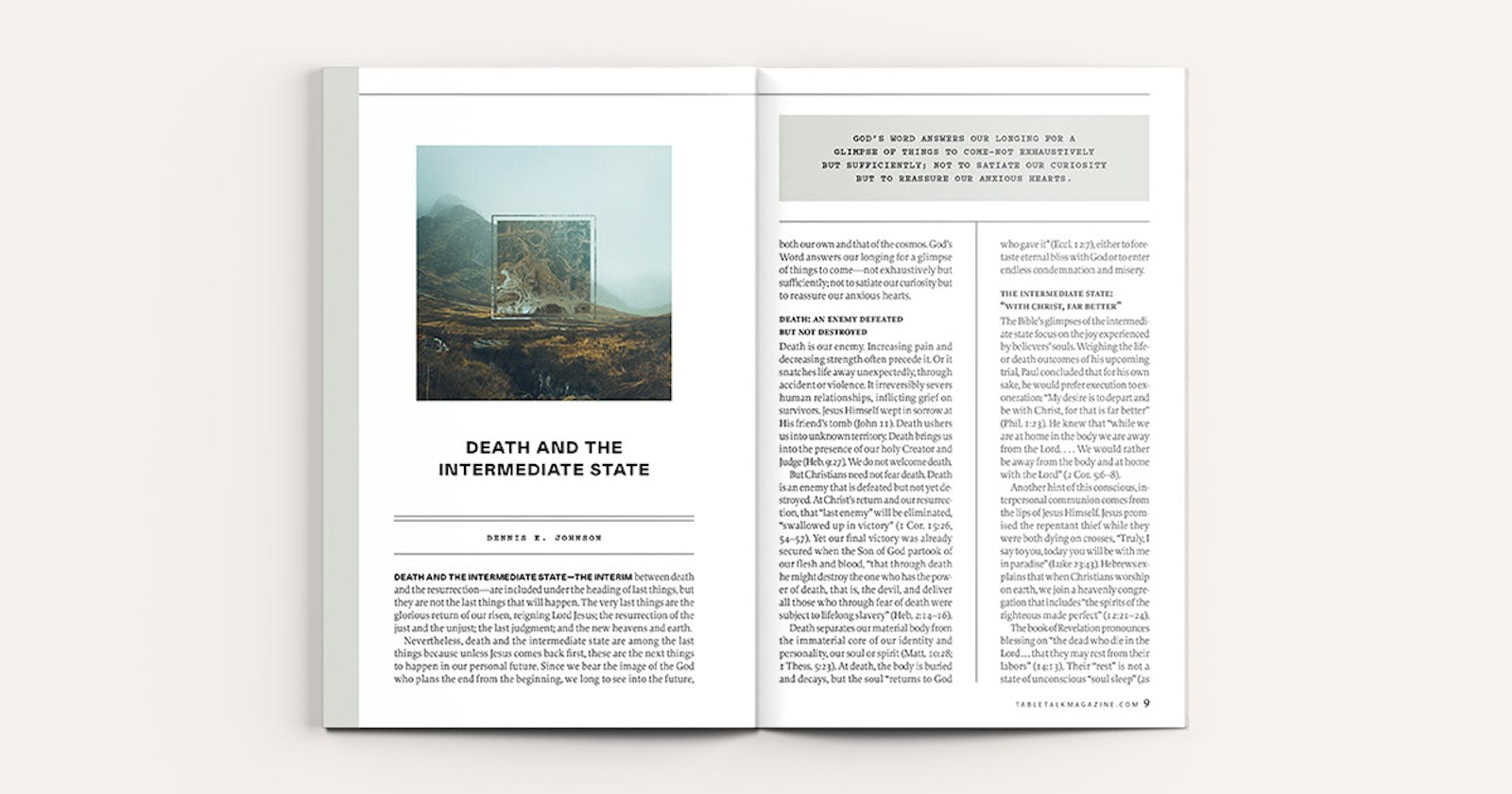
Request your free, three-month trial to Tabletalk magazine. You’ll receive the print issue monthly and gain immediate digital access to decades of archives. This trial is risk-free. No credit card required.
Try Tabletalk NowAlready receive Tabletalk magazine every month?
Verify your email address to gain unlimited access.
Death and the intermediate state—the interim between death and the resurrection—are included under the heading of last things, but they are not the last things that will happen. The very last things are the glorious return of our risen, reigning Lord Jesus; the resurrection of the just and the unjust; the last judgment; and the new heavens and earth.
Nevertheless, death and the intermediate state are among the last things because unless Jesus comes back first, these are the next things to happen in our personal future. Since we bear the image of the God who plans the end from the beginning, we long to see into the future, both our own and that of the cosmos. God’s Word answers our longing for a glimpse of things to come—not exhaustively but sufficiently; not to satiate our curiosity but to reassure our anxious hearts.
death: an enemy defeated but not destroyed
Death is our enemy. Increasing pain and decreasing strength often precede it. Or it snatches life away unexpectedly, through accident or violence. It irreversibly severs human relationships, inflicting grief on survivors. Jesus Himself wept in sorrow at His friend’s tomb (John 11). Death ushers us into unknown territory. Death brings us into the presence of our holy Creator and Judge (Heb. 9:27). We do not welcome death.
But Christians need not fear death. Death is an enemy that is defeated but not yet destroyed. At Christ’s return and our resurrection, that “last enemy” will be eliminated, “swallowed up in victory” (1 Cor. 15:26, 54–57). Yet our final victory was already secured when the Son of God partook of our flesh and blood, “that through death he might destroy the one who has the power of death, that is, the devil, and deliver all those who through fear of death were subject to lifelong slavery” (Heb. 2:14–16).
Death separates our material body from the immaterial core of our identity and personality, our soul or spirit (Matt. 10:28; 1 Thess. 5:23). At death, the body is buried and decays, but the soul “returns to God who gave it” (Eccl. 12:7), either to foretaste eternal bliss with God or to enter endless condemnation and misery.
the intermediate state: “with Christ, far better”
The Bible’s glimpses of the intermediate state focus on the joy experienced by believers’ souls. Weighing the life-or-death outcomes of his upcoming trial, Paul concluded that for his own sake, he would prefer execution to exoneration: “My desire is to depart and be with Christ, for that is far better” (Phil. 1:23). He knew that “while we are at home in the body we are away from the Lord. . . . We would rather be away from the body and at home with the Lord” (2 Cor. 5:6–8).
Another hint of this conscious, interpersonal communion comes from the lips of Jesus Himself. Jesus promised the repentant thief while they were both dying on crosses, “Truly, I say to you, today you will be with me in paradise” (Luke 23:43). Hebrews explains that when Christians worship on earth, we join a heavenly congregation that includes “the spirits of the righteous made perfect” (Heb. 12:21–24).

The book of Revelation pronounces blessing on “the dead who die in the Lord . . . that they may rest from their labors” (Rev. 14:13). Their “rest” is not a state of unconscious “soul sleep” (as some have contended). Rather, the souls of Christian martyrs appeal to God for justice and receive His word of comfort (Rev. 6:9–11; see Rev. 20:4). They are a multitude that has passed through great tribulation to worship before God’s throne and the Lamb (Rev. 7:9–17). They reign on heavenly thrones with Christ (Rev. 20:4).
Scripture says little about the intermediate state of unbelievers, but Jesus’ parable of the rich man and Lazarus (Luke 16:19–31) offers a clue. The parable’s point is that even a resurrection from the dead will not convince those who spurn Scripture. To support that conclusion, Jesus portrays the post-death conscious existence of a righteous beggar and a heartless tycoon. In this-worldly imagery, Jesus symbolizes comfort for the souls of the faithful (“Abraham’s side”), torment suffered by the souls of the ungodly (“this flame”), and the unbridgeable “chasm” that precludes unbelievers’ repentance and relief after death.
resurrection: better still
To depart in death and be with Christ is “far better” than life in this sin-cursed world, but that intermediate state is not our final hope. Better still is that day when our Savior appears from heaven to “transform our lowly [physical] body to be like his glorious [physical] body” and we are reconstituted as whole persons by God’s life-giving Spirit (Phil. 3:21).
